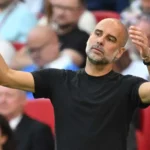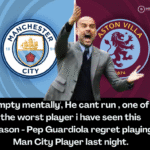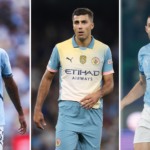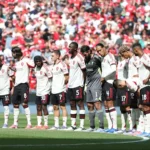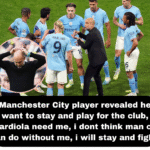Why the 2025 FA Cup final may be the last hurrah for Manchester City’s Super Star
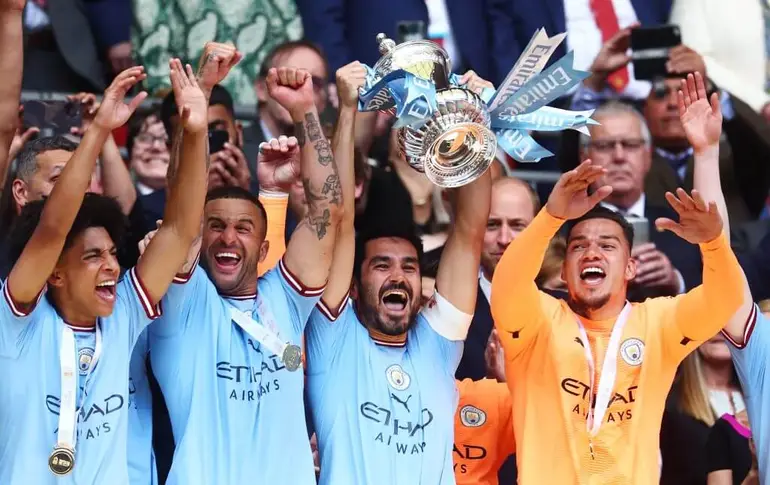
As Manchester City prepare to face Crystal Palace in the 2025 FA Cup final at Wembley Stadium this Saturday, there’s an unusual sense of finality in the air. For a club that has dominated English football for the better part of a decade, treating cup finals as merely another fixture in their relentless pursuit of excellence, this particular occasion carries a different weight – one of impending closure.
“I cannot identify my period at Manchester City without him,” Pep Guardiola said of Bernardo Silva in April, one of many such tributes the Catalan manager has paid to his players in recent months. Similar sentiments have been expressed about Ederson (“I cannot visualize our success without him”) and Kevin De Bruyne (“It cannot be possible what we have done in these many years without him”).
While Guardiola has always been prone to effusive praise, these statements feel less like hyperbole and more like eulogies for an era that is rapidly approaching its conclusion. The confirmation of De Bruyne’s summer departure has only crystallized what many observers have suspected: Saturday’s final may represent the last hurrah for a generation of players who have rewritten the record books of English football.
A Team for the Ages
Before exploring the uncertain future that awaits Manchester City, it’s worth pausing to appreciate the magnitude of what this group has accomplished. In an age of heightened competition and financial parity among the elite clubs, City’s dominance has been extraordinary:
- Four consecutive Premier League titles (2021-2024)
- A 100-point season that redefined excellence
- A domestic treble (Premier League, FA Cup, League Cup)
- The coveted Champions League, FA Cup, and Premier League treble
- Sustained excellence over multiple seasons with different tactical approaches
These achievements have not been the product of a single superstar or tactical innovation, but rather the confluence of extraordinary talents functioning in perfect harmony. Ederson’s revolutionary distribution transformed how goalkeepers are evaluated. De Bruyne’s combination of physical prowess and technical brilliance set new standards for midfield play. Bernardo Silva’s tactical intelligence and versatility provided the glue that held together various iterations of Guardiola’s system.
What makes this team truly special is not just the trophies, but the manner in which they’ve been won. At their best, City have produced football of mesmerizing quality – possession with purpose, positional fluidity, and tactical innovation that has forced every serious competitor to reconsider their approach to the game.
Signs of Change
The first clear indication that City’s golden generation might be approaching its conclusion came not with a player departure, but with their uncharacteristic mid-season slump. Between October and March, they won just 11 of 31 matches across all competitions – a stunning deviation from their usual standards. While they’ve since stabilized somewhat, occasional performances like the recent goalless draw at Southampton have sparked renewed calls for a squad overhaul.
Now, the departures are becoming official. De Bruyne’s exit has been confirmed, with his farewell set for Tuesday’s final home game of the season. Strong indications suggest Ederson will follow him out the door this summer. Bernardo Silva has been linked with a romantic return to Benfica, while questions remain about the futures of John Stones and Jack Grealish.
Even Kyle Walker, so fundamental to City’s success before his form deteriorated dramatically this season, has already departed on loan to AC Milan – a move precipitated partly by his declining performances and partly by the harsh criticism he received from sections of the fanbase.
The upcoming transition extends beyond the playing squad. Txiki Begiristain, the architect of City’s recruitment strategy since 2012, will hand over directorial duties to Hugo Viana after the Club World Cup. While this handover has been carefully managed, with Viana already working alongside Begiristain since March, any change in leadership brings uncertainty.
The Challenge of Replacement
City have successfully navigated key departures before. When legendary figures like Vincent Kompany, David Silva, and Sergio Aguero moved on, the club found innovative solutions:
- Ruben Dias stepped into Kompany’s leadership void
- Ilkay Gundogan evolved to provide Silva’s metronomic control
- Erling Haaland’s prolific scoring compensated for Aguero’s absence
However, the current transition feels more substantial – not just because of the number of potential departures, but because the pipeline of ready replacements appears less certain than in previous years.
Some recent signings have already failed to make the grade, with Kalvin Phillips loaned out after barely featuring. Matheus Nunes has found playing time only by reinventing himself as an emergency full-back. Julian Alvarez showed tremendous promise but has already moved on without a clear successor in place.
The current crop of emerging talents – Jeremy Doku and Savinho on the wings, for instance – show flashes of brilliance but remain unproven at the highest level. At 22 and 21 respectively, they represent the future, but whether they can become the kind of transformative figures that their predecessors were remains an open question.
Building the Next Great Team
City’s approach to this summer’s transfer market will be crucial. Reports indicate interest in several high-profile targets: Nottingham Forest’s Morgan Gibbs-White offers creativity and Premier League experience; Bayer Leverkusen’s Florian Wirtz represents one of Europe’s most coveted young talents; and AC Milan’s Tijjani Reijnders has shown the technical and positional attributes that typically thrive in Guardiola’s system.
Securing even one of these players would signal serious intent, but a more comprehensive refresh may be necessary given the scale of the potential exodus. The club will need to balance immediate needs with long-term planning, all while maintaining the competitive edge that has made them perennial contenders across all competitions.
One significant advantage remains: Pep Guardiola himself. The Catalan manager’s decision to extend his contract for two more years provides stability that would otherwise be absent. His presence alone makes City an attractive destination for elite players, and his tactical adaptability has repeatedly enabled the team to evolve without compromising its principles.
The Legacy of City’s Golden Generation
When the history of English football in the 2020s is written, this Manchester City team will feature prominently – mentioned in the same breath as Ferguson’s Class of ’92, Wenger’s Invincibles, and Mourinho’s first Chelsea dynasty. What distinguishes them, perhaps, is the sustainability of their excellence, maintaining an almost incomprehensible standard year after year.
Individual legacies have been secured. De Bruyne will be remembered as one of the Premier League’s greatest-ever midfielders, a player whose combination of vision, technique, and physical prowess made him virtually unstoppable at his peak. Ederson revolutionized goalkeeping, making the position an offensive weapon rather than merely a defensive safeguard. Bernardo Silva’s intelligence and versatility embodied Guardiola’s philosophy better than perhaps any other player.
Collectively, they’ve established Manchester City as a model club – not just successful but innovative, playing football that has advanced the tactical understanding of the game itself. Under Guardiola’s guidance, they’ve proven that dominance and aesthetic beauty need not be mutually exclusive.
One Final Glory?
Which brings us back to Saturday’s FA Cup final against Crystal Palace. For De Bruyne and potentially several of his long-time teammates, it represents an opportunity to add one final chapter to their City stories, to conclude with another trophy lifted into the Wembley sky.
Beyond the immediate stakes of the match itself – which include securing European qualification after a disappointing Premier League campaign – there’s a poignancy to this occasion that transcends the usual significance of an FA Cup final. It’s a chance for fans to show appreciation for players who have delivered countless moments of joy, and for those players to demonstrate once more why they’ve been considered among the best in the world.
The team’s recent form suggests they have steadied after their turbulent mid-season run, though the drab draw at Southampton offered a reminder of their vulnerability. Crystal Palace will provide stern opposition, having shown throughout the season that they can trouble the established elite with their counter-attacking prowess.
Whatever the outcome, this final feels like a watershed moment – the end of one chapter and the prelude to another. The question isn’t whether City can remain competitive; with their resources and infrastructure, that seems assured. Rather, it’s whether the next iteration of the team can achieve the same harmonious blend of individual brilliance, tactical sophistication, and collective spirit that has made the current group so special.
The Next Generation
While much of the focus has understandably been on potential departures, City’s future isn’t entirely uncertain. In Josko Gvardiol, they have a 23-year-old defender who has shown remarkable development throughout his first season in England. His versatility, technical ability, and physical attributes suggest he could become a cornerstone of City’s defense for years to come.
Phil Foden, at 25, has already been transitioning from promising talent to established star. His performances this season, particularly in De Bruyne’s injury absence, demonstrate that he’s ready to assume greater creative responsibility. Having grown up in City’s academy, he embodies the club’s identity in ways that even the most successful imports cannot.
And then there’s Erling Haaland, whose goalscoring exploits have sometimes masked his relative youth. At 24, the Norwegian striker remains years away from what would typically be considered a forward’s prime years. If City can build effectively around him, his presence alone guarantees a certain level of potency.
These players, along with others like Rico Lewis who are still establishing themselves, represent continuity amid change. They’ve absorbed the culture and standards of excellence established by the current generation and will be responsible for maintaining them going forward.
The Emotional Weight of Transition
For supporters who have witnessed the entirety of City’s golden era, there’s an emotional dimension to this transition that transcends sporting considerations. Players like De Bruyne, Bernardo, and Ederson aren’t merely performers who have provided entertainment; they’ve become woven into the fabric of supporters’ lives, delivering moments of ecstasy that will be recalled for decades to come.
The Champions League triumph in Istanbul, the dramatic final-day title clinchers, the masterclasses against domestic rivals – these shared experiences create bonds between players and fans that make departures feel like personal losses. There’s a bittersweet quality to watching beloved figures enter their final acts, especially when they’ve consistently performed at such extraordinary levels.
This sentiment was captured by a fan’s comment on the original article: “Not sure I’ve seen a more beautiful and fluid player than KDB, not to mention a great leader and person. I know I’ll be getting emotional as his minutes tick down; I’m not crying, you’re crying.”
Such reactions underscore that football, for all its increasingly business-like operations, remains fundamentally a game of emotional connection. The trophies matter, but so do the personalities who deliver them and the style in which they’re won.
The Guardiola Factor
One critical element in City’s transition plans is the continued presence of Pep Guardiola. The Catalan coach’s decision to extend his contract provides a bridge between eras, ensuring that while personnel may change, the underlying philosophy and standards will remain consistent.
Guardiola’s greatest strength has always been his adaptability – the ability to evolve his approach based on available players rather than forcing square pegs into round holes. From the possession-heavy approach of his early City years to the more direct style that has sometimes characterized the Haaland era, he’s shown a pragmatism that belies his reputation as a tactical idealist.
This flexibility will be crucial as City rebuild. New signings will need time to adapt, and the team’s style may need to evolve to accommodate different profiles of players. Guardiola’s presence offers reassurance that this process will be managed thoughtfully rather than reactively.
Moreover, his continued commitment signals confidence to potential recruits and existing squad members alike. Players know that under his guidance, they’ll be positioned to succeed individually while contributing to collective achievements. In a market where elite talent has numerous options, this competitive advantage shouldn’t be underestimated.
Learning from History
City’s current transition invites comparisons with other great teams that have faced similar watershed moments. Manchester United’s post-Ferguson struggles offer a cautionary tale about the dangers of poor succession planning, while Liverpool’s difficulty in replacing their aging midfield under Jürgen Klopp demonstrates how quickly competitive advantages can erode.
What distinguishes City from these examples is their proactive approach. The recruitment of Hugo Viana as Begiristain’s successor has been deliberately managed to ensure continuity. Key players like Gvardiol have been acquired with an eye toward the future rather than just immediate needs. The club’s exceptional academy continues to produce talents like Lewis who understand the City methodology from their formative years.
Nevertheless, transitions are inherently unpredictable. New signings can take longer than expected to adapt; emerging talents can stagnate; competitive rivals can make strategic leaps that change the landscape. City’s financial resources and institutional knowledge provide advantages, but they don’t guarantee continued dominance.
The Final Act
As Saturday’s FA Cup final approaches, there’s a sense that regardless of the result, it marks the conclusion of a remarkable period in Manchester City’s history. The combination of confirmed departures, potential exits, and natural evolution suggests that the team that takes the field at Wembley in May 2026 will look substantially different from the one that does so this weekend.
For the players who have defined this era – especially those who know it’s their final opportunity to win silverware with the club – there’s added motivation to deliver a performance worthy of their collective legacy. One last demonstration of the quality that has made them not just successful but transformative, not just winners but pioneers.
For the fans traveling to Wembley, there’s the bittersweetness of potentially witnessing the final act of players who have provided countless moments of joy. The opportunity to show appreciation for a group that has fundamentally altered expectations of what English football can be, both in terms of results and aesthetic quality.
And for neutral observers, there’s the privilege of watching a truly special team make what may be its final stand. Whatever one’s allegiance, the recognition that this City side has achieved something extraordinary during its peak years is difficult to dispute.
Football’s cyclical nature ensures that no dynasty lasts forever. Players age, motivation wanes, rivals adapt. What distinguishes the truly great teams is not just what they win, but how they’re remembered – the standard they establish, the boundaries they push, the imagination they capture.
By any reasonable measure, this Manchester City team has earned its place in the pantheon of football’s finest. Saturday’s final offers them one more chance to demonstrate exactly why.
